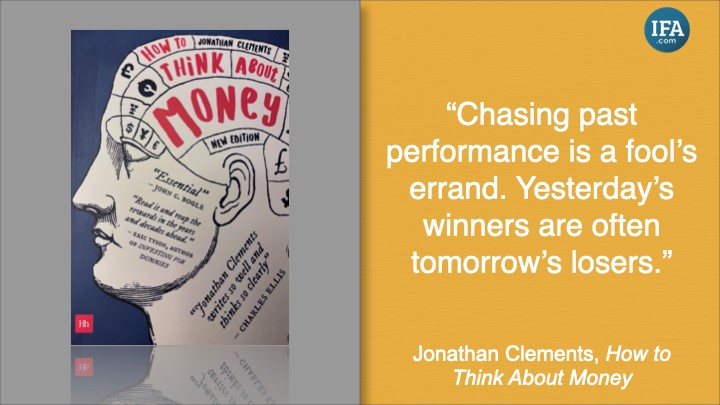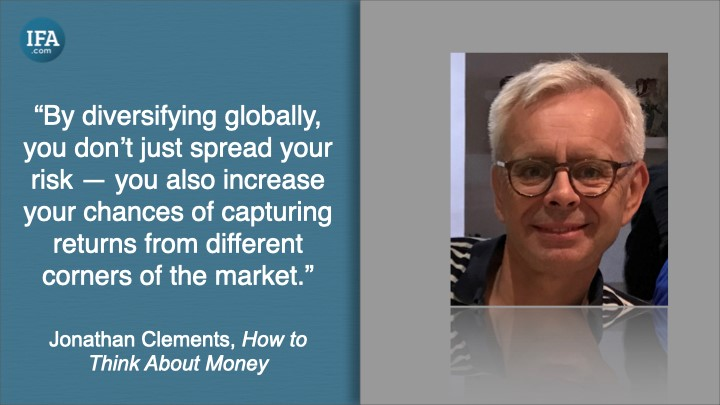Few people understand investing better than the journalist and author Jonathan Clements.
Born in England to a British mother and American father, Clements moved to the U.S. in his early 20s. He eventually joined The Wall Street Journal, where he spent nearly 20 years as a personal finance columnist.
In his newspaper articles, his numerous books, and his blog HumbleDollar, Jonathan has always blended financial wisdom with a focus on life satisfaction and wellbeing, making him one of the most trusted voices in the world of finance.
Sadly, Jonathan's most recent book, My Money Journey, is likely to be his last, because a few months ago he was diagnosed with terminal cancer. But, as he explains in this new IFA video, he continues to work and aims to enjoy each day to the full.
Clements says in that same interview that his views on investing were greatly influenced by Vanguard founder Jack Bogle. He was one of the first financial journalists to realize that the vast majority investors are better off using index funds and that he had a duty to tell them.
But, he says, on its own, using index funds is not enough to guarantee success. Here then are 20 tips for investors contained in his 2016 book How to Think About Money.
1. DON'T Aim To Outperform
Many investors assume that the primary goal for investors is to outperform. True, you might well be able to beat the market in the long run with a carefully designed portfolio of non-traditional index funds that target the specific risk exposures that have driven higher returns in the past. But, says Clements, outperformance is not the be-all-and-end-all. Your aim should be to harness the power of global capitalism in order to achieve your goals.
2. DON'T Buy Individual Stocks
Jonathan Clements has often warned against buying individual stocks. Why? Because global stock markets are generally very efficient. In other words, all available information is reflected in current prices, making it very hard to identify a stock that is underpriced. Yes, you might pick the occasional winner, but you probably won't do it consistently enough to make it worth your while.
3. DON'T Try To Time The Market
It can be very tempting for investors to try to time the market — to reduce your exposure just before markets fall and increase it again when they're about to recover. But, the author warns, market timing is a highly speculative activity that is best avoided. Again, you might get it right now and again; but doing so consistently is extremely difficult.
4. DON'T Use Active Funds
Clements is no fan of actively managed funds, for three main reasons. First, they're far more expensive than passively managed, or rules-based, funds. Secondly, it's very hard to predict, in advance, who the winners are going to be. And thirdly, active investors are more likely to buy and sell than index investors, and therefore make poor decisions.
5. DON'T Use Complex Products
A recurring theme in Jonathan Clements' writing is that, generally speaking, the financial industry is not the investor's friend. In particular, he says, the industry complicates investing to justify higher fees. He warns that hedge funds, private equity funds, and structured products are particularly expensive and lacking in transparency, and, for most investors, are completely unnecessary.
6. DON'T Chase Performance
A common mistake, the author says, is to chase performance. In other words, investors like to buy securities, funds and asset classes that have recently risen in value and to sell those whose value has fallen. This often results in buying high and selling low — the very opposite of what active investors want to be doing.

7. DON'T Follow Your Gut
Often in life "go with your gut" is good advice. But warns Clements, it's not a sound strategy for investors. Why not? Because, he says, however smart we like to think we are, our gut instinct is often wrong. Instead, he advocates a disciplined, data-driven approach over intuitive or impulsive choices.
8. DON'T Be Fazed By Uncertainty
Human beings in general, and investors in particular, dislike uncertainty. But, Jonathan Clements explains, uncertainty is just part of the territory when it comes to investing in stocks. Indeed, it's the uncertainty attached to future returns that produces the so-called equity premium. The answer, he says, is not just to tolerate uncertainty but positively embrace it.
9. DON'T Focus On The Short Term
As the author says, it's only human to focus on the recent past and what's happening now, in front of our eyes. The point is, stock markets are bound to fall from time to time, but those short-term stumbles will become irrelevant. "What matters," he writes, "is the long-term trend — a steady upward march."
10. DON'T Forget Taxes
Instead of focusing entirely on fees and charges, Clements says investors should remember another significant cost — taxes. He advises choosing investments, like index funds, that minimize taxes. He also recommends tax loss harvesting as a strategy to offset capital gains with losses, thereby reducing taxable income.
There are ten things that Jonathan Clements urges investors to avoid in How to Think About Money. Here are ten more things he says you should be doing to maximize your chances of achieving your investment goals.
11. DO Prioritize Saving And Investing
It seems so obvious, but it's such an important point that it needs re-stating: if you want to be financially independent in the future, you need to make sacrifices today. Clements points out that the savings rate — how much you actually invest — is ultimately even more important than the rate of return you receive.
12. DO Keep Your Strategy Simple
Jonathan Clements is a strong proponent of simplicity, emphasizing the value of low-cost, diversified, and straightforward approaches like indexing. Simple strategies, he says, have several benefits, not least that investors are more likely to stick to a strategy they properly understand.
13. DO Keep Your Costs Low
Clements is a big believer in minimizing fees to maximize returns. Even relatively modest fees, he says, can significantly erode returns over time, due to the power of compounding. It's largely because of the lower fees they incur that investors in index funds tend are likely to outperform investors in active funds over time.
14. DO Stay Broadly Diversified
Another golden rule of successful investing, the author explains, is broad diversification. No, it won't eliminate systematic, or market, risk, but it will reduce the risk of being too heavily concentrated in a particular country, sector or asset class. It will also give you exposure to a wider range of investment opportunities around the world.

15. DO Focus On Avoiding Mistakes
A common misunderstanding is that successful investing entails making genius moves, and spotting opportunities or risks that others don't. But, says Clements, it's better to focus on avoiding catastrophic errors. Investors, he says, should know their limitations and learn from their mistakes so they don't repeat them.
16. DO Resist The Urge To Act
Another mistake investors make is that they try to do too much. They assume that doing something is better than doing nothing when the opposite is usually true. Jonathan Clements advocates a hands-off, buy-and-hold approach to investing which keeps human decision-making to a minimum.
17. DO Recognize Your Behavioral Biases
Inevitably, though, investors do need to make decisions and, when you do, the author says you should always ensure that you're acting in a rational way. All investors are prone to behavioral biases that undermine sound decision-making. The key is to recognize and counteract them, preferably with the help of an advisor with expertise in behavioral coaching.
18. DO Keep Your Emotions In Check
As well as managing their behavioral biases, Clements warns that investors also need to control their emotions — fear, greed and regret, for example. The biggest danger, he says, is that investors panic and sell their stocks, or at least reduce their exposure, when markets fall. Emotional discipline is key to achieving long-term success.
19. DO Remember What The Goal Is
Jonathan Clements has often reminded readers to focus on life satisfaction rather than accumulating wealth for its own sake. He recommends working with an adviser to work out what you really want from life and to produce a financial plan that aligns with your values and priorities.
20. DO Live For Today
Yes, ensuring that you have enough money to sustain your chosen lifestyle for the rest of your life is crucially important. But, as Clements knows all too well after being diagnosed with inoperable cancer, tomorrow is promised to no one. The trick is to balance the need to secure your financial future with enjoying life today.
HOW CAN WE HELP YOU?
Do you have any questions about this subject, or any other issue related to investing? If you do, we would love to address them in future content.
Simply email your question to [email protected] with your name and where you live and we'll do our best to answer it.
*Quotes and pictures are utilized for illustrative purposes only and should not be construed as an endorsement, recommendation, or guarantee of any particular financial product, service, or advisor.
Robin Powell is the Creative Director at Index Fund Advisors (IFA). He is also a financial journalist and the editor of The Evidence-Based Investor. This article reflects IFA's investment philosophy and is intended for informational purposes only.
This article is intended for informational purposes only and reflects the perspective of Index Fund Advisors (IFA), with which the author is affiliated. It should not be interpreted as an offer, solicitation, recommendation, or endorsement of any specific security, product, or service. Readers are encouraged to consult with a qualified Investment Advisor for personalized guidance. Please note that there are no guarantees that any investment strategies will be successful, and all investing involves risks, including the potential loss of principal. Quotes and images included are for illustrative purposes only and should not be considered as endorsements, recommendations, or guarantees of any particular financial product, service, or advisor. IFA does not endorse or guarantee the accuracy of third-party content. For additional information about Index Fund Advisors, Inc., please review our brochure at https://www.adviserinfo.sec.gov/ or visit our website at www.ifa.com.














